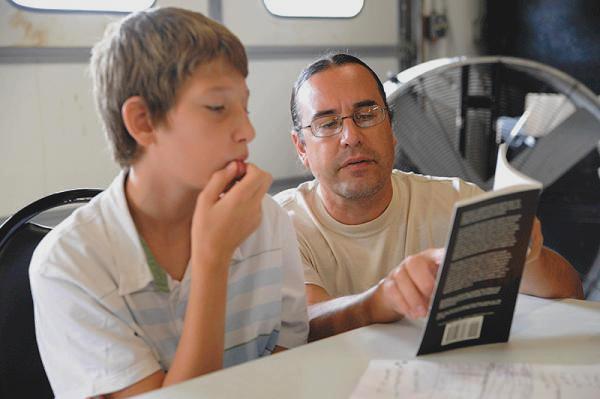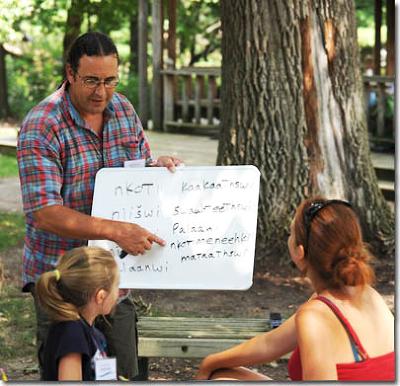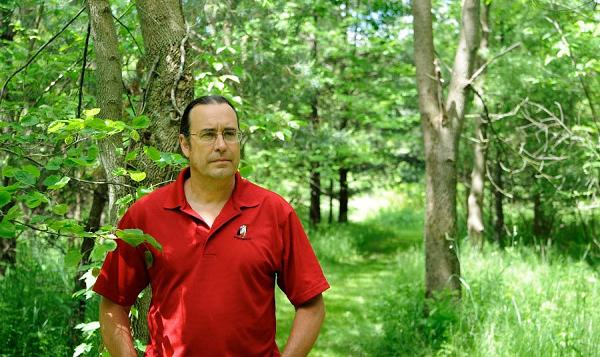 |
Canku Ota
|
 |
|
(Many Paths)
|
||
|
An Online Newsletter
Celebrating Native America
|
||
|
November 2016 - Volume
14 Number 11
|
||
|
|
||
|
Myaamia Language
Preservationist Wins Genius Grant
|
||
|
by Mary Annette Pember
- Indian Country Today Media Network
|
||
Daryl Baldwin of the Miami Tribe described learning that he'd been chosen as one of the 2016 MacArthur Fellows as "a surreal experience." Commonly known as the "genius grant," the fellowship includes a no-strings-attached award of $625,000. Recipients must meet three criteria: exceptional creativity, promise for important future advances based on a track record of significant accomplishment, and potential for the fellowship to facilitate subsequent work. Winners are nominated anonymously. "I have no idea who nominated me. I was completely blown away," he said of learning that he was selected to receive the fellowship. Baldwin, a Myaamia (Miami) language linguist and cultural preservationist
at Miami University in Ohio, is among 23 fellows who received grants
this year. He is the founding director of the school's 2001 Myaamia
Project, which was later named the Myaamia Center. The Center is
an initiative from the Miami Tribe of Oklahoma within Miami University
designed to conduct research to assist educators in preserving and
teaching the Myaamia language and culture. The Center also offers
opportunities for students to learn about the language and culture
of the tribe after which Miami University was named.
Although the last native Myaamia speaker passed away in the 1960s around the time that Baldwin was born, he gained an early interest in the language after stumbling across some old papers belonging to his grandfather that had Myaamia language printed on them. "I always knew I was a Miami Indian but other than historical and genealogical information, I didn't know much more than that," Baldwin said. After finding his grandfather's papers, he was inspired to learn about the language. "In the early 1990s, scholars described the Myaamia language as dead. I didn't much care for that description," he recalled. Determined to learn more, he met a non-Native graduate student, David Costa, who was conducting research on the Myaamia language. Today Costa is one of seven employees of the Myaamia Center. "We began revitalizing the language so the current generation
(of the Miami tribe) will have a stronger connection to their heritage.
There is a tremendous amount of cultural information associated
with our language that we as a living people, descendants of the
Miami Tribe want to preserve," Baldwin explained.
He initially taught himself the language and later home schooled his four children who are now fluent Myaamia speakers. Revitalizing the language has also provided an opportunity for healing over the loss of language and culture that occurred when the tribe was removed from their homelands in Ohio and relocated to Oklahoma. "Our people are now empowered to reestablish those tribal bonds, personal and kin based, that is the glue of language," Baldwin noted. Baldwin and his colleagues also conduct research for the preservation and rediscovery of Myaamia ways of knowing, including projects focused on harvesting practices and seasonal activities and diets; mapping the landscape and land uses of the traditional homeland; reconstructing the traditional Myaamia lunar calendar; documenting Myaamia ethnobotany practices; and development of curricula and training materials for teaching and learning the Miami language. The center also offers educational opportunities for both tribal members and the larger student body of the university. Enrolled members of the Miami Tribe receive a fee waiver from the university through the school's Heritage Award. Students who attend the school are required to take several Myaamia language and cultural courses as part of their study. Many have gone on to work in tribal language programs developed by the Myaamia Center such as day care and K-12 programs located in Oklahoma. "We get a great cross fertilization through the Heritage Award. Students come here, learn language and culture and return home to share what they've learned," he said. There are 32 Miami tribal students enrolled this semester. So far, 60 undergraduate and 6 graduate students have earned degrees at the university since the award program began in 1991. As for the future Baldwin said," I haven't quite wrapped my head around what the Fellowship will mean for us. The Myaamia Center has been a 20-year effort for the tribe, Miami University, staff and myself. I need time to consult with them about how we can move forward." Overall, he thinks his grandfather, who knew only a couple of words in the Myaamia language when he passed away in the 1970s would be proud of all Baldwin has accomplished. Baldwin is the first scholar at Miami University to win the MacArthur Fellowship. |
||||||
|
|
|
|
||
|
|
||
| Canku Ota is a free Newsletter celebrating Native America, its traditions and accomplishments . We do not provide subscriber or visitor names to anyone. Some articles presented in Canku Ota may contain copyright material. We have received appropriate permissions for republishing any articles. Material appearing here is distributed without profit or monetary gain to those who have expressed an interest. This is in accordance with Title 17 U.S.C. Section 107. | ||
|
Canku Ota is a copyright ©
2000 - 2016 of Vicki Williams Barry and Paul Barry.
|
||
 |
 |
|
|
The "Canku
Ota - A Newsletter Celebrating Native America" web site and
its design is the
|
||
|
Copyright ©
1999 - 2016 of Paul C. Barry.
|
||
|
All Rights Reserved.
|
||


